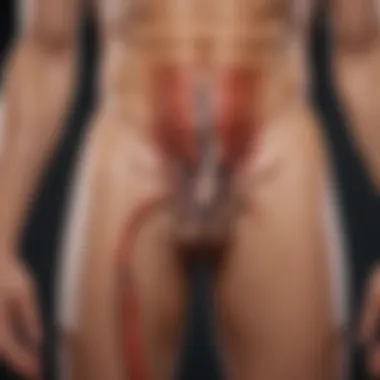Understanding Nocturia in Males: Causes and Management


Intro
Nocturia, a condition marked by the need to wake up during the night to urinate, presents unique challenges for many men. It is not merely a nuisance. It can disrupt sleep, affect daily activities, and influence overall quality of life. Understanding the causes behind nocturia is essential, as is recognizing its symptoms and exploring potential management strategies.
Most men experience nocturia at some point as they age. However, its frequency and impact can vary widely among individuals. This article aims to delve into the complexities of nocturia, the physiological and pathological factors involved, and the practical approaches to alleviating its symptoms.
Key Takeaways
- Nocturia is defined as nocturnal urination that affects the ability to sleep well.
- It can be caused by various factors, including age, underlying health conditions, and lifestyle choices.
- Proper diagnosis often involves understanding patient history and conducting relevant tests to identify contributing issues.
- Treatment may range from lifestyle adjustments to medical interventions, depending on the specific cause.
Important Statistics
- Research shows that approximately 30% of men over 60 experience nocturia more than twice a night.
- The prevalence of nocturia increases with age, affecting nearly 50% of men aged 70 and older.
Understanding Causes
Nocturia can be caused by a range of factors. These causes can be categorized into physiological and pathological groups. Physiological causes include age-related changes in bladder function and prostate enlargement, which is common in older men. Pathological causes might include chronic illnesses such as diabetes, heart failure, and urinary tract infections. Additionally, lifestyle factors such as excessive fluid intake or the consumption of diuretics can exacerbate nocturia.
Signs and Symptoms
Identifying the symptoms of nocturia is vital for effective management. The primary symptom is the need to wake up at night to urinate. This can lead to disrupted sleep patterns, resulting in daytime fatigue, mood disturbances, and a general decline in life quality. Symptoms may vary in intensity and frequency and can often be linked to underlying health conditions.
Management Strategies
Successful management of nocturia must take into account the underlying causes. Here are common strategies that can be adopted:
- Lifestyle Modifications: Reducing fluid intake, especially before bedtime, and limiting caffeine or alcohol can significantly decrease nocturia episodes.
- Behavioral Techniques: Implementing scheduled bathroom trips during the night can help establish a better routine.
- Medication: In some cases, medications such as desmopressin may be prescribed to reduce urine production at night.
- Medical Devices: Some men may benefit from using penile clamps or absorbent products to manage symptoms.
"Understanding nocturia helps inform effective management. This highlights the necessity to evaluate both lifestyle choices and medical conditions that can worsen the situation."
Practical Tips
Steps for Improvement
- Track Fluid Intake: Keeping a diary of fluid consumption can illuminate patterns that contribute to nocturia.
- Adjust Eating Habits: Avoid large meals close to bedtime.
- Exercise Regularly: Physical activity can improve overall health and potentially contribute to better sleep.
By taking these steps, men may see an improvement in not only nocturia but overall well-being.
Finale
Nocturia is a significant concern for many men. Understanding its causes, symptoms, and management strategies can greatly assist in improving quality of life. There exists a spectrum of effective management options. Careful evaluation of lifestyle habits and health conditions is the key to relief.
Preface to Nocturia
Nocturia is a common yet frequently overlooked subject that warrants attention, especially among males. It is more than just a minor inconvenience; it often represents underlying health issues. The frequency of nighttime urination can disrupt sleep patterns and affect overall well-being. Understanding nocturia is essential for health professionals, wellness coaches, and related practitioners to identify conditions that could contribute to this phenomenon.
Across various studies, nocturia has been shown to impact men's quality of life significantly. The article intends to dissect the causes and implications of this condition while providing guidelines on management strategies.
Definition of Nocturia
Nocturia is defined as the need to awaken more than once during the night to urinate. This condition is not merely an expression of excessive fluid intake or a weak bladder; it is a symptom that may indicate other medical issues. In clinical terms, nocturia is diagnosed when a patient experiences this disruption multiple times weekly, affecting their sleep and daily functioning. Several factors contribute to nocturia, making it a multi-faceted issue that deserves detailed examination.
Prevalence in Males
The prevalence of nocturia in males is striking. Studies suggest that nearly 60% of men aged 60 and older report experiencing nocturia. The symptoms often increase with age, but they may also arise due to various lifestyle choices and medical conditions. Other research indicates a noticeable prevalence among middle-aged men, making it important for health professionals to encourage open conversations about this issue.
This high rate of occurrence in the male population can have serious implications for mental and physical health. Addressing nocturia is essential, as untreated cases can lead to complications such as sleep disturbances, mood disorders, and reduced quality of life.
"Nocturia may be a symptom of underlying medical conditions, which may require further investigation and management."
In summary, recognizing nocturia as a significant health concern is crucial. This understanding lays the groundwork for further exploration into its causes, implications, and management strategies throughout the article.
Physiological Factors Influencing Urination at Night
Understanding the physiological factors that influence urination at night is pivotal for addressing nocturia in males. Awareness of these factors can lead to better diagnostic accuracy and management strategies. This section delves into two essential aspects: the normal aging process and diurnal variation in urine production. Both play a significant role in how nocturia manifests and how it can be effectively managed.
Normal Aging Process
As men age, various physiological changes occur that can influence urinary patterns. The bladder becomes less elastic, reducing its capacity. In addition, the prostate often enlarges, which can obstruct urine flow. These anatomical changes often lead to increased incidences of nocturia. Older individuals may also experience reduced production of the hormone vasopressin, which helps concentrate urine.
This leads to a greater volume of urine being produced at night. As a result, older men might find themselves waking more frequently to urinate, contributing to sleep disturbances. Management strategies tailored to the aging population are essential. These may include bladder training techniques and, in some cases, medication to address prostate issues or hormonal imbalances.
Diurnal Variation in Urine Production
Diurnal variation refers to the natural fluctuations in urine output throughout a 24-hour period. Typically, urine production is less during the night when the body is at rest. However, some health conditions and lifestyle factors can disrupt this natural rhythm. For instance, eating large amounts of fluids or consuming diuretics like caffeine or alcohol close to bedtime can significantly increase nighttime urination.
Moreover, underlying medical conditions such as diabetes or heart failure can alter the balance between day and night urine production, leading to excessive nighttime urination. Understanding this variation is crucial. Patients should be educated on how their daily habits may influence their nocturnal symptoms and encouraged to adjust their behaviors accordingly.
The interplay of age and diurnal rhythms makes understanding nocturia multifaceted. By addressing these physiological aspects, we can better equip individuals with strategies to mitigate their symptoms and improve their sleep quality.
Common Medical Conditions Linked to Nocturia
Nocturia can frequently indicate underlying medical conditions, particularly in males. Understanding these common ailments is essential for the effective management of nocturia. Health practitioners must recognize how conditions like benign prostatic hyperplasia, diabetes mellitus, and heart failure relate to increased nighttime urination. By identifying these links, better treatment plans can be developed. This section will detail each of these conditions to highlight their importance and relevance to nocturia.
Benign Prostatic Hyperplasia


Benign prostatic hyperplasia, or BPH, is a common condition in aging men characterized by the enlargement of the prostate gland. This enlargement can constrict the urethra and obstruct urine flow, resulting in various urinary symptoms, including nocturia. In fact, studies indicate that a significant percentage of men with BPH report nocturia as a primary complaint.
Symptoms associated with BPH may include:
- Frequent urination, especially at night
- Difficulty starting urination
- Weak or interrupted urine stream
- A feeling of incomplete bladder emptying
Management of BPH typically involves lifestyle modifications, medication, and sometimes surgical interventions. It’s crucial for healthcare providers to explore these factors when treating patients experiencing nocturia.
Diabetes Mellitus
Diabetes mellitus, particularly poorly controlled diabetes, can lead to nocturia as well. Elevated blood sugar levels may cause increased urine production, contributing to the need to urinate frequently during the night. Both types of diabetes, Type 1 and Type 2, can play a role in this condition.
Key aspects are:
- Increased thirst and fluid intake, leading to nighttime urination
- Possible nerve damage affecting bladder function
Management focuses on controlling blood sugar levels through diet, medication, and exercise. Understanding the relationship between diabetes and nocturia is vital in providing comprehensive care for affected patients.
Heart Failure
Heart failure can also significantly impact nocturia in males. The condition leads to fluid retention, which can result in excess urination during the night as the body attempts to eliminate fluids while lying down. Patients often experience increased urination at night due to changes in blood flow and pressure as well.
Common signs of heart failure to watch for include:
- Shortness of breath during activity or when lying flat
- Swelling in the legs, ankles, or abdomen
Effective management of heart failure may involve medication to reduce fluid retention and lifestyle changes. Addressing nocturia in these patients can enhance their overall quality of life.
Understanding the connections between these medical conditions and nocturia allows for a more focused approach to patient care. It is essential that healthcare professionals take these relationships into account when diagnosing and treating nocturia.
Medications and Their Impact on Nighttime Urination
Understanding the role of medications in nighttime urination is crucial for managing nocturia effectively. Many men experience nocturia as a side effect of various medications. Recognizing these medications can help healthcare professionals tailor treatment plans. Additionally, patients can make informed decisions about their use of such drugs. This section reviews two categories of medications: diuretics and other prescription drugs that may contribute to increased nighttime urination.
Diuretics
Diuretics are commonly prescribed to treat conditions such as hypertension, heart failure, and edema. These medications increase urination by promoting the excretion of water and salts from the body. While they are effective in managing certain health issues, their impact on nocturia is significant. Men taking diuretics may experience heightened frequency of night trips to the bathroom.
Key considerations regarding diuretics include:
- Timing: The timing of diuretic doses can greatly affect nighttime urination. When taken too late in the day, they can disturb sleep patterns. Prescribing morning doses can help mitigate this issue.
- Type of diuretic: Different types of diuretics may have varying effects on urine output. Loop diuretics, such as furosemide, have a more potent effect compared to thiazide diuretics.
- Patient condition: Individual patient conditions may alter diuretic response. This means that a tailored approach is often necessary for optimal management.
Other Prescription Drugs
Beyond diuretics, several other prescription medications can contribute to nocturia. This encompasses a range of drug classes with diverse primary purposes. Examples include certain antihistamines, antidepressants, and some medications for neuropathy.
Noteworthy medication impacts involve:
- Antihistamines: These often have a drying effect that can increase urinary retention, potentially leading to more frequent urination at night as the bladder fills more fully.
- Antidepressants: Some antidepressants can affect bladder function, leading to increased urinary urgency or frequency.
- Alpha-blockers: Typically used for prostate issues, these can relax muscles around the bladder neck, facilitating urination but sometimes resulting in increased nighttime trips.
It's important for patients and healthcare providers to actively communicate about the potential side effects of medications, especially regarding nocturia. Being aware of the medications that may contribute to nighttime urination allows for better management strategies which can significantly enhance overall quality of life.
While medication management is vital, it should be part of a comprehensive approach to dealing with nocturia. Regular consultation with healthcare providers can lead to better tailored treatment plans.
By understanding how medications affect urinary patterns, men can work with their healthcare providers to minimize nocturia's impacts.
Lifestyle Factors Contributing to Nocturia
Lifestyle factors play a substantial role in the development and experience of nocturia in males. Understanding these factors can provide essential insights for managing nocturia effectively. By recognizing how daily habits influence nighttime urination, individuals can make informed adjustments to their routines. This section delves deeper into several lifestyle components that are particularly relevant to nocturia.
Fluid Intake Patterns
Monitoring fluid intake is vital for individuals struggling with nocturia. Excessive consumption of fluids, especially in the evening, can lead to increased urination at night. Men should be aware of their drinking habits, particularly regarding beverages containing caffeine and alcohol. These substances act as diuretics, prompting urine production.
- Strategic Timing: It is advisable to limit fluid intake a few hours before bedtime. This practice can significantly reduce nighttime trips to the restroom.
- Types of Fluids: Not all fluids contribute equally to nocturia. Water should be the primary drink, while caffeinated or alcoholic beverages should be minimized in the hours leading up to sleep.
Dietary Influences
Dietary choices can have a notable impact on nocturia. Certain foods and nutrients affect urinary function and fluid retention. For instance, high salt intake can lead to increased thirst and subsequent fluid consumption. This pattern may aggravate nocturia symptoms. Additionally, some individuals may find that spicy or acidic foods trigger urinary urgency or discomfort during night hours.
- Balanced Nutrition: Maintaining a balanced diet that minimizes excessive sodium can help manage symptoms.
- Food Timing: Eating large meals late at night can disrupt sleep and may increase the likelihood of nocturia. Smaller, earlier dinners could improve overall nighttime comfort.
Sleep Patterns and Quality
Quality of sleep is closely related to nocturia. Disrupted sleep can exacerbate feelings of urgency, leading to more frequent awakenings during the night. It’s essential to cultivate healthy sleep habits that promote restorative rest.
- Consistency: Regular sleep schedules help regulate the body’s internal clock, which may reduce disturbances caused by nocturia.
- Sleep Environment: Creating a comfortable sleep environment is critical. Factors such as temperature, noise, and light should be adjusted to promote more profound, uninterrupted sleep.
"Sleep hygiene is not just about well-being, but it can also influence urinary patterns. The better one sleeps, the more controlled and less frequent the trips to the bathroom can become."
Ultimately, these lifestyle factors underscore the importance of personal habits in managing nocturia. Through small, mindful changes in drinking behaviors, diet, and sleep patterns, individuals can significantly impact their nighttime urination experience. Recognizing and addressing these factors is a practical step toward improving overall quality of life.
Psychological Aspects of Nocturia
Nocturia, the condition of waking up at night to urinate, can disrupt the psychological well-being of affected individuals. Understanding the psychological impact of nocturia is crucial, as it not only involves physical symptoms but also bears significant mental and emotional implications. Psychological considerations help in recognizing how alarming the condition can feel and how it affects daily life and overall health.


Impact on Sleep Quality
A good night’s sleep is essential for optimal health, yet nocturia directly compromises sleep quality. Frequent trips to the bathroom can lead to insufficient rest, resulting in fatigue during the day. The constant interruption can decrease the overall sleep efficiency, where individuals may struggle to return to sleep after each interruption.
Consequently, the lack of restful sleep can produce a cascade of problems. Individuals may experience irritability, decreased concentration, and impaired cognitive functions. Lack of sleep may even exacerbate the very condition that causes nocturia.
"Chronic sleep deprivation is linked to heightened urgency and frequency of urination, creating a difficult cycle that is challenging to escape."
Anxiety and Stress Factors
The psychological burden of nocturia is not only about disrupted sleep. Anxiety often emerges from the anticipation of needing to urinate at night, leading to a heightened state of stress. Patients may worry about finding their way to the bathroom safely, especially if they have mobility concerns or live in a multi-story residence.
In many cases, nocturia can lead to social withdrawal. The fear of embarrassment or accidents inhibits participation in social activities or even simple family gatherings. Such behavioral changes can lead to feelings of isolation and even depression. Addressing these emotional concerns is crucial for managing nocturia effectively.
To combat these factors, it is vital for health professionals to approach nocturia not just as a physical condition but as one that significantly impacts psychological health. Comprehensive management should include both medical interventions and psychological support.
Diagnosis of Nocturia
Diagnosing nocturia is essential for understanding and addressing the underlying causes of frequent nighttime urination in males. It is the first step towards identifying potential health issues that may require intervention. Proper diagnosis not only helps in formulating an effective treatment plan but also assists in assessing the impact on quality of life.
Patient History and Symptoms Review
The initial step in the diagnostic process involves collecting a comprehensive patient history. This includes an exploration of the individual's urinary patterns, frequency of urination during the night, and any accompanying symptoms such as incontinence or urgency. Patients often need to maintain a voiding diary over several days to provide detailed information about fluid intake, output, and timing of urination. This information can be invaluable in identifying factors that contribute to nocturia.
Key points to consider during the review include:
- The onset and duration of symptoms.
- Any changes in lifestyle or medication.
- Medical history, especially relating to urinary tract infections or prostate issues.
- Impact of nocturia on sleep quality and daily life.
A nuanced understanding of these factors can provide insight into whether the nocturia stems from physiological changes or underlying medical conditions.
Medical Assessments and Tests
Once the patient history is reviewed, medical assessments and tests are necessary to determine the root causes of nocturia. Common diagnostic approaches include:
- Physical examination: This helps assess general health conditions and identify any abnormalities in the urinary system.
- Laboratory tests: Urinalysis may be performed to check for infections, blood, or other unusual components in the urine. Blood tests can also provide information on kidney function and overall metabolic health.
- Imaging studies: Ultrasound may be used to evaluate the bladder and kidneys. This provides visual insights into structural issues that may contribute to nocturia.
- Urodynamic testing: These tests assess bladder function and can reveal abnormalities in how the bladder stores and releases urine.
Understanding these diagnostic methods is key to identifying the type of nocturia and its contributors. Timely and accurate diagnosis can greatly enhance the management strategies employed.
Management Strategies for Nocturia
Nocturia can significantly affect the quality of life in males. Addressing this condition involves a variety of management strategies that can alleviate symptoms and improve overall wellbeing. This section emphasizes the necessity of a thoughtful approach to managing nocturia, outlining specific strategies that can be employed, the benefits tied to them, and vital considerations that may arise during treatment.
Behavioral Modifications
Behavioral modifications serve as the first line of defense against nocturia. The primary goal is to reduce the frequency of nightly bathroom visits through simple lifestyle changes. Individuals might consider altering fluid intake habits, particularly in the evening. Reducing consumption of fluids, especially caffeine and alcohol, prior to bedtime is often recommended, as these beverages can irritate the bladder and promote increased urine production.
Moreover, establishing a regular voiding schedule can help train the bladder to hold urine for extended periods. Encouraging patients to use the bathroom right before sleep is also beneficial, as it minimizes the likelihood of waking up during the night. Mindfulness and relaxation techniques may further assist in calm sleep, potentially reducing nighttime awakenings.
"Behavioral changes can significantly enhance the quality of sleep and overall health in men experiencing nocturia."
Here are some effective behavioral modifications to consider:
- Fluid management: Limit fluid intake in the hours leading up to bedtime.
- Scheduled bathroom breaks: Urinate before going to bed and establish a schedule for daytime voiding.
- Sleep hygiene: Maintain a comfortable sleep environment, as good sleep can minimize disruptions.
Such modifications not only help reduce nocturia symptoms but also foster a healthier lifestyle and better sleeping patterns.
Medications and Treatments
When behavioral modifications do not yield satisfactory results, medical interventions may be necessary. Several medications are available that may help manage nocturia effectively. These treatments can be tailored based on individual needs and underlying causes of nocturia.
Medications like desmopressin, anticholinergics, and beta-3 agonists are often considered for managing nocturia. Desmopressin can reduce urine production at night, while anticholinergics work by relaxing the bladder muscles. Beta-3 agonists help improve bladder capacity, which can decrease nighttime urination.
Before starting any medication, it is essential to consult with a healthcare professional to discuss potential side effects and interactions with other drugs the patient may be taking. Regular reviews of medication effectiveness and patient feedback will optimize treatment protocols.
In addition to medications, certain medical devices and therapies, such as the use of a specialized bladder training regimen or electrical stimulation, may offer solutions. However, these options are often explored as second-line treatments, generally reserved for individuals who do not respond to initial therapy.
"It is crucial to work closely with healthcare professionals to find the most appropriate management strategies for nocturia."
To summarize:
- Medications: Consider options like desmopressin or anticholinergics based on individual diagnosis.
- Consultation: Regular consultation with healthcare providers to monitor progress and adjust treatments as needed.
- Alternative therapies: Explore additional therapies if medications alone are insufficient.
Alternative and Complementary Approaches
Alternative and complementary approaches provide valuable options for managing nocturia in males. They offer potential remedies that do not solely rely on conventional medicine and can enhance overall well-being. These strategies often focus on natural and holistic methods, addressing not just the symptoms but also the underlying causes of nocturia.
Such approaches encourage a comprehensive view of health, considering psychological, emotional, and physical aspects. Often, these methods can also help in reducing reliance on pharmaceuticals, which may have side effects. Below, we will examine two popular alternative therapies.
Herbal Remedies
Herbal remedies have gained attention for their potential to alleviate nocturia symptoms. Many plants possess diuretic properties and other qualities that can influence urinary function. Common herbal options include:
- Saw Palmetto: This herb is often used to support prostate health, potentially reducing urinary symptoms related to benign prostatic hyperplasia.
- Cranberry: Known for its role in urinary health, cranberry may help reduce infections and improve urinary tract function.
- Pumpkin Seed Extract: This extract is believed to support bladder function and may be beneficial for urinary frequency.
While these remedies can offer benefits, it is important for individuals to consult with healthcare providers before starting any herbal regimen. The quality of these products can vary significantly. Proper guidance ensures safe and effective use without interaction with other medications.


Acupuncture and Other Therapies
Acupuncture is another alternative approach that may help in managing nocturia. This traditional Chinese medicine technique involves inserting thin needles into specific points on the body to stimulate energy flow. Research has suggested that acupuncture can improve various conditions, including bladder dysfunction and stress-related issues, which may indirectly impact nocturia.
Other therapies might also be considered, such as:
- Cognitive Behavioral Therapy (CBT): This approach can address anxiety and other emotional factors that may contribute to nocturia.
- Lifestyle Modifications: Simple changes, like scheduled bathroom visits and fluid management, can complement these therapies.
Effective management involves a combination of techniques tailored to the individual. Each person's experience with nocturia is unique, and so the approach should be too.
Exploring alternative and complementary approaches encourages patients to take an active role in their health. These methods can create a more profound overall impact, addressing both the condition and the general quality of life.
Preventive Measures and Long-Term Management
Preventive measures and long-term management are crucial parts of handling nocturia in males. Addressing this issue not only improves nighttime urination patterns but also significantly enhances the overall quality of life. These strategies can empower patients, allowing them to take control over their symptoms and reduce their impact on daily life.
Regular Health Check-Ups
Regular health check-ups are essential for effective management of nocturia. These physical examinations help identify underlying conditions that might contribute to nocturia, such as diabetes or heart problems. Early detection can lead to more effective treatment and management plans. During these appointments, healthcare providers may review medications and assess lifestyle factors that impact urinary health. For example, changes in medication dosage or type can have a significant effect on nocturnal urination.
Moreover, check-ups are an opportunity for patients to discuss their symptoms openly. They can highlight any changes observed over time. Keeping a symptom diary might also be a practical approach. This record provides valuable information to healthcare providers, making it easier to form a diagnosis and tailor management strategies accordingly. Regular consultations ensure an ongoing dialogue between patients and healthcare professionals, fostering a proactive stance on managing nocturia.
Educating Patients on Symptoms and Help
Education is a powerful tool in managing nocturia. Many patients may not fully understand the causes or implications of their condition. By educating themselves on nocturia, individuals can recognize symptoms early and seek appropriate help. This knowledge enhances self-awareness and encourages proactive management.
Healthcare professionals should provide clear information about nocturia's potential causes. Understanding that life choices, medications, and health issues play a role may motivate patients to adopt healthier habits. For instance, discussing fluid management practices encourages limiting intake before bedtime.
Additionally, educational resources can help patients understand when it is necessary to seek help. If nocturia significantly disrupts sleep or daily life, it's crucial to consult a healthcare provider. Providing guidance on available therapies or lifestyle modifications further empowers patients. Simple steps, like maintaining a regular sleep schedule or practicing relaxation techniques before bed, can also mitigate symptoms.
"Education is essential for patients to understand nocturia. With the right knowledge, they can navigate their health more effectively."
In summary, regular health check-ups and education on symptoms are key strategies in preventive measures and long-term management of nocturia. Emphasizing these areas can significantly improve patient outcomes and enhance their quality of life.
Quality of Life Implications
The issue of nocturia significantly influences the quality of life of affected individuals. Understanding these implications is essential for promoting better management and encouraging timely interventions. Nocturia can interfere with various aspects of daily living, impacting both the physical and mental well-being of men who experience this condition.
Impact on Daily Activities
Nocturia often leads to sleep disturbances. Frequent trips to the bathroom at night can disrupt sleep patterns, resulting in sleep deprivation. This lack of restful sleep can diminish cognitive function, leading to issues such as poor concentration, difficulty in decision-making, and decreased productivity during daytime activities. Consequently, men may find it challenging to perform tasks at work or engage in social interactions due to fatigue and irritability.
Moreover, individuals may adapt their daily routines to minimize nighttime awakenings. Some may restrict fluid intake in the evening, impacting hydration and dietary habits. They might also avoid engaging in activities that require physical stamina, further limiting their quality of life. It creates a cycle of limitation and frustration, affecting not just physical health but overall life satisfaction.
Social and Psychological Effects
The social implications of nocturia are profound. Many individuals hesitate to participate in social gatherings or travel, fearing they may not have easy access to bathrooms. This avoidance can lead to feelings of isolation and loneliness, thus affecting relationships with family and friends.
Psychologically, the anxiety stirred by potential accidents or discomfort during outings can intensify. Some individuals may develop a heightened sense of stress around their condition, and in severe cases, this could lead to depression. The mind-body connection is evident here; the challenges of dealing with a health issue can substantially impact mental health, creating a need for holistic approaches to management.
"The cycle of nocturia can lead to a significant deterioration in quality of life, stirring both physical and emotional concerns."
In summary, recognizing and addressing the quality of life implications derived from nocturia is crucial. Awareness can prompt necessary lifestyle changes and foster open discussions with healthcare providers, leading to better management.
By navigating these dimensions carefully, sufferers of nocturia can find ways to reclaim their life satisfaction and overall well-being.
Future Directions in Nocturia Research
Nocturia is increasingly recognized as a significant health issue in males, often affecting their quality of life. The exploration of future directions in nocturia research is essential. This segment aims to highlight emerging treatments, advancements in technology, and the pivotal role that personalized medicine will play in addressing this condition. By focusing on these elements, we can enhance our understanding and management of nocturia.
Emerging Treatments and Technologies
Current management strategies for nocturia have limitations, which leads to a pressing need for innovative treatments. Studies are underway investigating new pharmacological options that target the underlying causes of nocturia rather than just the symptoms. Treatments like vasopressin analogs show promise in reducing nighttime urination by mimicking the natural hormone that regulates water retention.
Moreover, advanced technologies are emerging as pivotal tools in the diagnosis and treatment of nocturia. Devices that monitor fluid intake and urination patterns are being developed. Wearable technologies can provide real-time data, allowing healthcare providers to personalize treatment plans based on real-world evidence. This data-driven approach may significantly improve outcomes for patients struggling with nocturia.
"The integration of technology in nocturia management could pave the way for better patient adherence and optimized treatment plans."
The Role of Personalized Medicine
Personalized medicine is redefining how healthcare is approached and has significant implications for nocturia treatment. This method tailors medical treatment to the individual characteristics of each patient. Factors such as genetic predisposition, coexisting medical conditions, and specific lifestyle attributes can influence an individual's response to treatment for nocturia.
As research continues to evolve, personalized medicine may lead to customized therapies based on a patient’s profile. For instance, understanding the metabolic pathways involved in nocturia can help identify which patients are more likely to benefit from certain medications.
Furthermore, the use of pharmacogenomics could inform the prescribing of medications for nocturia. By identifying how patients metabolize specific drugs, healthcare providers can minimize side effects and maximize efficacy.
In summary, the future of nocturia research looks promising. By embracing emerging treatments, using advanced technologies, and shifting toward personalized medicine, healthcare professionals can provide more effective solutions for males dealing with nocturia. These advancements will not only aim to reduce the frequency of nighttime urination but also improve the overall quality of life for individuals impacted by this condition.
Culmination
In reviewing nocturia, this article reveals several key points regarding its significance in men's health. Recognizing nocturia as more than a simple nuisance is crucial. It can be a symptom of underlying health issues that warrant attention. This understanding can influence the management and treatment strategies available to males experiencing frequent nighttime urination.
Summary of Key Points
- Nocturia is a Common Condition: Many males experience nocturia, and it can impact their daily life and sleep quality.
- Multiple Causes: The condition arises from various factors, including age, medical conditions like benign prostatic hyperplasia and diabetes, medication side effects, and lifestyle choices.
- Diagnosis is Essential: Proper evaluation through a detailed patient history and medical tests helps identify the cause, leading to effective management strategies.
- Management Options are Diverse: Treatments range from behavioral modifications to medications and complementary therapies. Understanding these options can enhance the quality of life for those affected.
Encouragement for Seeking Help
It is essential for males experiencing nocturia to seek professional help. Many may feel embarrassed discussing this issue, but engaging healthcare professionals is vital. Timely medical advice can lead to a better understanding of the condition and appropriate interventions. Knowing when to seek help includes recognizing the impact of nocturia on sleep and daily activities.
Seek guidance from doctors who specialize in urology or primary care. Professionals can provide tailored treatment plans that address both symptoms and their root causes. Taking action is a critical step towards alleviating distress associated with this condition.
By addressing nocturia proactively, individuals can improve their overall wellbeing and reclaim their nights.







